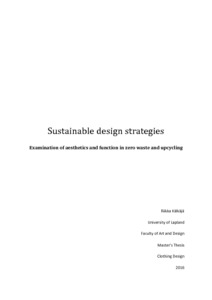Sustainable design strategies: Examination of aesthetics and function in zero waste and upcycling
Kälkäjä, Riikka (2016)
Kälkäjä, Riikka
Lapin yliopisto
2016
openAccess
Julkaisun pysyvä osoite on
https://urn.fi/URN:NBN:fi:ula-201606161233
https://urn.fi/URN:NBN:fi:ula-201606161233
Tiivistelmä
Tutkimuksen tavoitteena on tarkastella sustainable design strategy -käsitettä suunnittelijan näkökulmasta. Tutkimuksen viitekehys rakentuu vaatteen funktionaali-suuden ja esteettisyyden ympärille, jossa hypoteesina on, että ekologisesta suunnittelusta voidaan puhua vain silloin kun nämä kaksi elementtiä yhdistyvät tuotteessa. Tutkimus on toteutettu laadullisena hermeneuttisena tutkimuksena, jonka teoreettinen viitekehys käsittelee muodin teoriaa, ihmisten perustarpeita, ekologista suunnittelua, kestävyyttä sekä sustainable design strategy -käsitettä. Laajan teoriaperehdytyksen tarkoituksena on laajentaa ekologisen suunnittelun kontekstia, sekä sitä miten tämä vaikuttaa design-tuotteen laatuun. Tutkimuksen tarkasteluun on valittu zero waste ja upcycling -strategiat, joita analysoidaan etenkin funktionaalisuuden ja esteettisyyden lähtökohdista. Tutkimuk-sen tarkoituksena on selvittää ennen kaikkea sitä, miten nämä kaksi strategiaa vaikuttavat tuotteen ekologisuuteen. Tutkimuksen aineisto koostuu kuudesta asukokonaisuudesta, jotka on suunniteltu käyttäen joko zero waste tai upcycling -strategiaa. Analyysin ensimmäisessä vaiheessa käytetään Marilyn Delongin kehittelemää esteettisen analyysin mallia, jonka jälkeen siirrytään tarkastelemaan vaatteen funtionaalisuutta pohjautuen Victor Papanekin funktiomatriisiin. Tutkimuksen tulokset osoittavat, että esteettisyydellä ja funktionaalisuudella on vaikutusta tuotteen ekologisuuteen. The objective of the research is to examine sustainable design strategies from a designer's point of view. The frame of the thesis is based upon the notion of function and aesthetics and the hypothesis is that when these two elements coincide within design only then can we speak of sustainable design. The research is a qualitative hermeneutic study and the theoretical framework consists of theories that explain the fashion system, basic human needs, sustainable design, durability and sustainable design strategies as forms of waste management. All in all, the point of the theoretical framework is to expand the context of sustainable design and what it means in terms of design qualities. In the centre focus of the thesis there are two design strategies: zero waste and upcycling. The aim of the study is to find out whether function and aesthetics can be seen in these two strategies and if
they really affect the overall sustainability of the clothing. The research material consists of six different cases that are designed using either zero waste or upcycling as the principal design strategy. The first stage of the analysis deals with aesthetic analysis method developed by Marilyn Delong and the second stage is conducted by using Victor Papanek's function matrix as a reference. The results of the research point to the conclusion that both aesthetics and function have an effect on the overall sustainability of the design.
they really affect the overall sustainability of the clothing. The research material consists of six different cases that are designed using either zero waste or upcycling as the principal design strategy. The first stage of the analysis deals with aesthetic analysis method developed by Marilyn Delong and the second stage is conducted by using Victor Papanek's function matrix as a reference. The results of the research point to the conclusion that both aesthetics and function have an effect on the overall sustainability of the design.
Kokoelmat
- Pro gradu -tutkielmat [4942]
